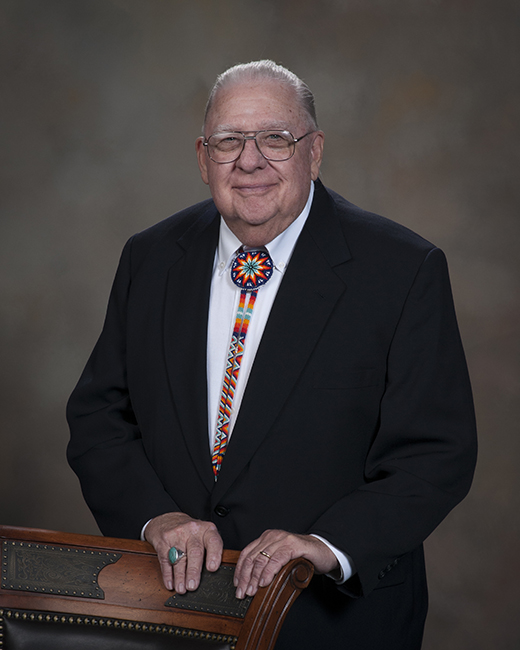Entomologist fashioned Army career protecting troops from disease
CONTRIBUTED BY Breanne Hill, Media Relations.
This article appeared in the January 2017 edition of the Chickasaw Times
The 2017 Chickasaw Nation calendar features 12 Chickasaw veterans who served during World War II and the Korean War. This month, 79-year-old Korean War veteran U.S. Army Col. Gene Thompson (ret.), of Ada, Okla., is profiled. Col. Thompson served for over 20 years, specializing in an area of service that is rarely recognized, but vital to every soldier’s survival - entomology.
“It’s the study of insects,” Col. Thompson said. “You don’t think of that when you think of the Army. Everyone sees the guy with the weapon on the front lines. We were basically in charge of making sure the food that guy ate was free of bugs and that he was protected from disease.”
During his time in war-ravaged Korea, Col. Thompson fought a range of bug- and germ-related epidemics, from encephalitis and lice, to infant deaths and contaminated water. His knowledge, combined with the efforts of the Army, helped save the lives of both American soldiers and local citizens.
“It gave you a lot of personal satisfaction because you could directly see your efforts paying off,” he said. “To see that change - providing clean water, preventing the outbreak of diseases - by the time I got out of Korea, I was hooked on the career.”
Col. Thompson went on to head the U.S. Armed Forces Pest Management Board. Upon his retirement in 1983, he was awarded the Defense Superior Service Medal.
As a “retiree” he stayed busy with tasks such as teaching special classes at medical schools and managing federally-funded HIV studies.
“I was fortunate,” he said. “Because of my military career I always had plenty of offers and plenty of things to do, even in retirement.”
Now, Col. Thompson hopes younger people will find inspiration in his story and realize every branch of the military offers a variety of career choices.
“The opportunities are vast,” he said. “We used to say it takes three people supporting every one person who is carrying a weapon. You need people who know technology. You need mechanics, physicians, pilots, truck drivers, and on and on. People don’t stop to think about all the positions that have to be filled.”
When he entered the Army, the draft was active. All men between the ages of 18 and 35, who didn’t fight in World War II, were called to duty for an average of two years.
The draft doesn’t exist today and the American military is made up entirely of volunteers. It relies on recruiting and capturing the interest of young people.
“You see the ads on television,” Col. Thompson said. “They’re really for a modern Army.”
In this modern Army, enlistees can sign up for a particular specialty. They will still experience boot camp and the Army lifestyle, and Col. Thompson believes they may also be taking the first step toward a fulfilling, life-long career.
“With a military career, you never get stuck in a rut,” Col. Thompson said, “because every three years, on average, you’re going to have change and be sent somewhere else, so you have a new set of challenges.”
You must also stay on top of the latest innovations in your specialty in order to be ready for the next assignment. This is a difficult habit for Col. Thompson to break. He still keeps track of what’s going on in entomology and says what he sees underlines how important it is to bring fresh minds into the field.
“There are new diseases coming along all the time, like the mosquito-borne diseases that we’ve seen lately, that are all new viruses and organisms,” he said. “And we’re still trying to whip malaria.
“Every 60 seconds, somewhere in the world, somebody dies of malaria. It’s hard for people in the United States to understand because we’re pretty well protected. But a water-borne disease or an insect-borne disease can take out a large portion of a smaller country.”
Col. Thompson’s curious mind and natural empathy made him a perfect fit for entomology. His agricultural background also gave him basic knowledge about the impact insects can make on the environment.
“My whole life is a series of ‘God-things’,” he said. “I got into FFA my senior year by rigging my school schedule so I could take it in the afternoons. I was on the insect judging team in FFA. My uncle talked me into majoring in entomology in college, even though I wanted to be a rancher. It all led me to the right place.”
Col. Thompson grew up in a poor, but happy, household. He remembers the “rationing mentality” that began in the Great Depression and followed his family into World War II. But, he said, he had still never seen anything like the living conditions he witnessed while working in the Army overseas. Those experiences changed him.
“Those people over there were devastated,” he said. “Had I not been in the Army, I don’t think I would have appreciated how other people live. I don’t think I would have appreciated the fact that almost everywhere you go, there are good people who need help.
“In the Army, I think you gain an appreciation for life, and you gain pride in the fact that you are a part of sustaining life. No matter what you do in the Army, no matter your specialty, you are helping sustain somebody’s life somewhere.”